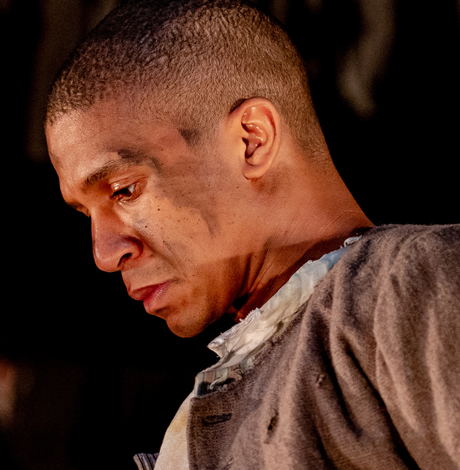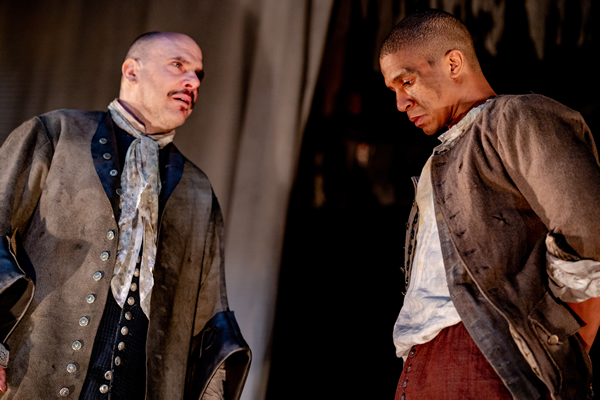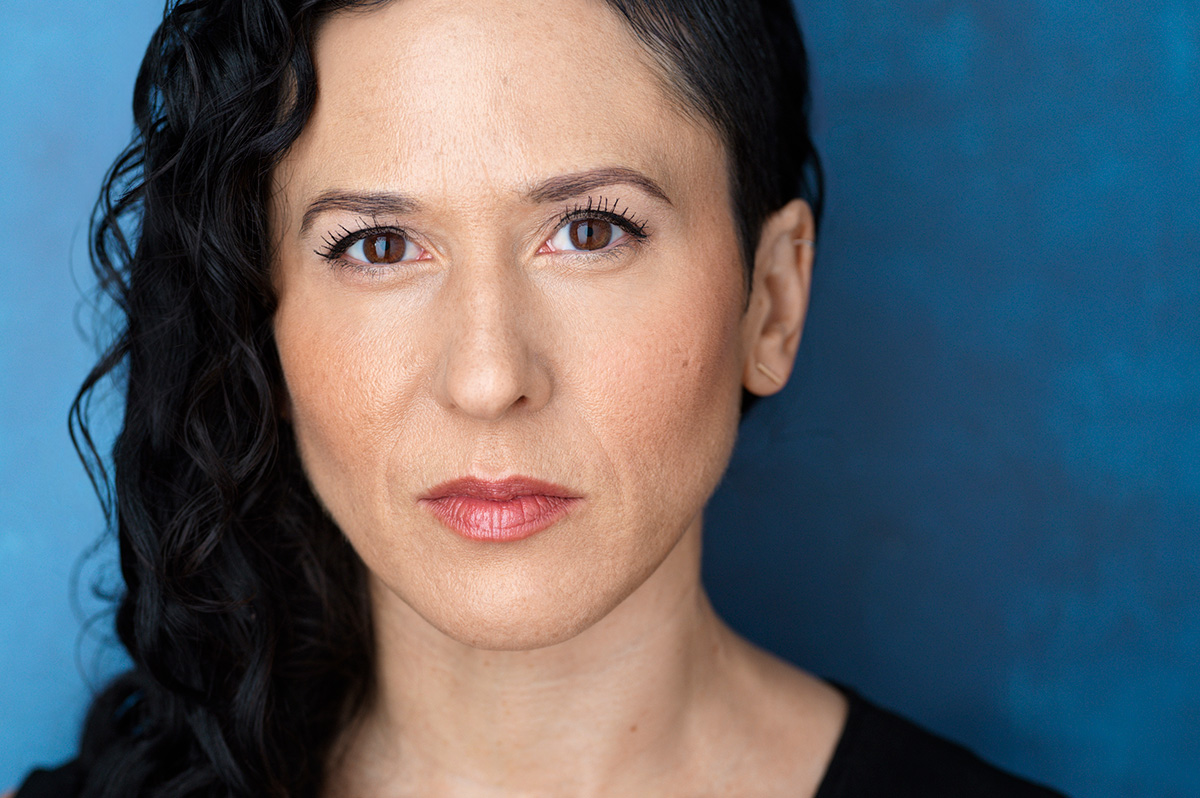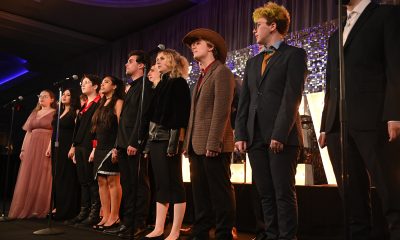Theater
FALL ARTS 2018 THEATER: ‘Macbeth,’ ‘King John’ and Kahn’s swan song
Iron Crow tackles ‘Laramie Project,’ Synetic offers ‘Sleepy Hollow’


Chris Genebach, on left, and Jaysen Wright in ‘Macbeth’ at Folger Theatre. (Photo by Brittany Diliberto; courtesy Folger)
The fall theater season is proving to be an exciting mix of classics, area premieres and some promising new works. And, like always, LGBT theater professionals are playing a big part in making it happen.
In memoriam of the 20th anniversary of Matthew Shepard’s death, Baltimore’s award-winning queer company Iron Crow Theatre (45 West Preston St., Baltimore) presents“The Laramie Project” through Sept. 23. With just eight actors playing about 60 characters, the seminal 2000 work weaves together interviews, journal entries and published news reports about the hate crime murder of the gay University of Wyoming student. It’s written by out playwright Moisés Kaufman and the members of Tectonic Theater Project and John Knapp directs. Full details at ironcrowtheatre.org.
Signature Theatre (4200 Campbell Ave., Arlington) continues with its season opener, an exquisite production of Stephen Sondheim’s “Passion” through Sept. 23. Set in 1860s Italy, Passion portrays the unlikely but intense relationship between a dashing young soldier and his commanding officer’s plain and ill-fated cousin Fosca. Out actor Claybourne Elder and Natascia Diaz give stellar performances. It’s beautifully staged by out director Matthew Gardiner.
Also, at Signature, out director Joe Calarco helms “Heisenberg” Sept. 18-Nov. 11. In this hit Broadway play, Simon Stephens (“The Curious Incident of the Dog in the Night-Time”) writes about a chance encounter on a London train that changes two people’s lives. Full details at sigtheatre.org.
Folger Theatre (201 E. Capitol St., S.E.) has kicked off the season with a wildly entertaining production of William Davenant’s Restoration era adaption of Shakespeare’s “Macbeth” (through Sept. 23). There’s a lot happening here: fabulous period music performed by the Folger Consort, expanded roles for the witches and Lady Macbeth, and lots of blood and flourish. What’s more, director Robert Richmond has opted to stage a play within a play and set the action in London’s notorious Bedlam asylum. The uniformly excellent large cast includes Ian Merrill Peakes in the title role and Kate Eastwood Norris as his wife. Also featured is out actor Jaysen Wright as an asylum inmate with PTSD who’s been cast to play Lenox
Next up at Folger, Aaron Posner directs Shakespeare’s epic royal power struggle, Shakespeare’s “King John” (Oct. 23-Dec. 2). The cast includes Kate Eastwood Norris as Philip the Bastard and out actor Holly Twyford as Constance. Full details at folger.edu/folger-theatre.
Taffety Punk (Capitol Hill Arts Workshop, 545 7th St., S.E.) presents Sadie Hasler’s dark comedy “Pramkicker” through Sept. 29. Find out what happens after a woman loses it in a café, kicks a pram and is then arrested and sent to anger management training. Details at taffetypunk.com.
At Mosaic Theater Company (Atlas Performing Arts Center, 1333 H St., N.E.) it’s “Marie and Rosetta,” running through Sept. 30. Geroge Brant’s terrific play with music takes a glimpse into the personal/professional relationship of gospel singer and rock and roll pioneer Sister Rosetta Tharpe and singer/pianist Marie Knight. It’s cleverly staged by Sandra L. Holloway with vibrantly memorable performances by Roz White and Ayana Reed. Full details at mosaictheater.org.
Woolly Mammoth Theatre Company (641 D St., N.W.) starts the season with “Gloria,” running through Sept. 30. Penned by Branden Jacobs-Jenkins, the 2016 Pulitzer Prize finalist centers on the cutthroat culture of the New York magazine world. The cast includes talented out actor Justin Weaks. Kip Fagan directs. Full details at woollymammoth.net.
Through Oct. 7, “South Pacific” runs at Olney Theater Center (2001 Olney-Sandy Springs Road, Olney, Md.). The Rodgers & Hammerstein’s timely classic about love, war and racism is directed by Alan Maraoka. Full details at olneytheatre.org.
Theater Alliance (Anacostia Playhouse, 2020 Shannon Pl., S.E.) opened the season with “The Events,” running though Oct. 7. Scottish playwright David Greig tells the story of Clare, the lone survivor of a mass shooting. Colin Hovde directs. Full details at theateralliance.com.
GALA Hispanic Theatre (3333 14th St., N.W.) is presenting the U.S. premiere of the romantic comedy “Como agua para chocolate (Like Water for Chocolate),” through Oct. 7. Adapted from the novel by Laura Esquivel, the play (performed in Spanish with English surtitles), is the story of a young woman trapped by traditions who finds freedom in cooking “so magical it inspires people to laugh, cry and burn with desire.” The cast includes Luz Nicolás and out actor Carlos Castillo. Full details at galatheatre.org.
Studio Theatre (1501 14th St., N.W.) enters fall with “If I Forget,” through Oct. 14. Written by Bethesda native Steven Levenson, it’s the story of a modern, D.C. Jewish family grappling with aging parents, Israel and real estate. Matt Torney directs. Full details at studiotheatre.org.
Ford’s Theatre (511 10th St., N.W.) presents “Born Yesterday” (Sept. 21-Oct. 21). Directed by Aaron Posner, this terrific satirical comedy about an opportunistic tycoon who arrives in 1940s Washington with his naive girlfriend to game the political system (sound familiar?). Kimberly Gilbert stars as Billie Dawn, the role that Judy Holliday made famous. Full details at fords.org.
The Klunch (D.C. Arts Center, 2438 18th St., N.W.) opens its season with the world premiere of “How to Win a Race War” (Sept. 21-Oct. 30). Written and directed by The Klunch’s out artistic director Ian Allen, the three-part comedy is “a parody of white supremacist ‘race war’ fiction, which has proliferated in the years since Timothy McVeigh named William Pierce’s “The Turner Diaries” as inspiration for his brutal 1995 bombing of a federal building in Oklahoma City.” (18 and older only). Full details at theklunch.com.
Shakespeare Theatre Company (Lansburgh Theatre, 450 7th St., N.W.) kicks off legendary out artistic director Michael Kahn’s final season with “The Comedy of Errors” (Sept. 25-Oct. 28). Staged by out director Alan Paul, the Bard’s madcap farce revolves around mishaps of two sets of twins, each with the same name. The top-notch cast includes out actors Sarah Marshall and Tom Story.
Later into STC’s season, Michael Kahn directs David Ives’ “The Panties, The Partner and The Profit: Scenes from the Heroic Life of the Middle Class” (Dec. 4-Jan. 6). Moving from Boston in 1950 to Wall Street in 1986 to lavish Malibu today, Ives’ funny new work is an adaption of Carl Sternheim’s epic trilogy, “Scenes from the Heroic Life of the Middle Classes.” Full details at shakespearetheatre.org.
Synetic Theater (1800 South Bell Street, Chrystal City) is set to give its movement-based interpretation of the spooky tale of Ichabod Crane and his encounters with the Headless Horseman in “Sleepy Hollow” (Oct. 3-Nov. 4). Details at synetictheater.org.
At Round House Theatre (4545 East-West Highway, Bethesda) Amber Paige McGinnis makes her directorial debut staging out playwright Paula Vogel’s magnificent “How I learned to Drive” (Oct. 10 – Nov. 4). The award-winning play heartbreakingly chronicles a woman’s attempt to break the silence and cycle surrounding sexual abuse. Ayssa Wilmoth Keegan stars as Li’l Bit. Details at roundhousetheatre.org.
Constellation Theatre Company (1835 14th St., N.W.) begins its “Epic Love” season with Elton John and Tim Rice’s “Aida” (Oct. 11- Nov. 18). Staged by out director Michael J. Bobbitt, the musical follows a love triangle involving Nubian princess Aida who’s been kidnapped from her country; Radames, the Egyptian captain who enslaved her people; and his fiancée Princess Amneris. Details at constellationtheatre.org.
At the National Theatre (1321 Pennsylvania Ave., N.W.) fall is filled with music — new and not so new. First, it’s “Beetlejuice” (Oct. 14-Nov. 18). Alex Timbers directs the pre-Broadway world premiere of this new musical comedy, based on Tim Burton’s quirky iconic film. After that, it’s the road show of the Tony Award-winning Broadway hit “Beautiful: the Carole King Musical” (Nov. 27-Dec. 30). Details at Thenationaldc.org.
At Theater J (offsite performance, Arena Stage, 1106 6th St., S.W.), it’s Anna Ziegler’s provocative new play “Actually” (Oct. 17-Nov. 18). Johanna Gruenhut directs this provocative new play about issues surrounding sexual consent at American colleges. The cast features Sylvia Kates and out actor Jaysen Wright. Details at Theaterj.org.
WSC Avant Bard (Gunston Arts, 2700 South Lang St., Arlington) presents the intriguing “Illyria, or What You Will,” a work freely adapted from Shakespeare’s “Twelfth Night” (Oct. 18-Nov. 19). Conceived by Jonelle Walker and Mitchell Hébert and directed by Hébert, the piece “reimagines Shakespeare’s comedy of mixed-signal love in a downtown Manhattan dive bar in the early 1980s, where identity, sex and gender are what you will.” The 11-person cast features out actors Christopher Henley and Frank Britton. Full details at wscavantbard.org.
The Kennedy Center presents “Anastasia” (Oct. 30-Nov. 25), a romantic musical by Lynn Ahrens and Stephen Flaherty about the fabled Grand Duchess Anastasia who may or may not have escaped execution during the Russian Revolution. Details at kennedy-center.org.
Arena Stage (1101 6th St., S.W.) presents “Anything Goes” (Nov. 2-Dec. 23). Staged by Arena’s artistic director Molly Smith, this Cole Porter comedy musical about love and hijinks on a New York to London bound luxury cruiser features — among many standards — “You’re the Top” and “I Get a Kick Out of You.” Corbin Blue plays young lovestruck Wall Street broker Billy Crocker. Full details at arenastage.org.
D.C.’s company dedicated to the LGBT experience, Rainbow Theatre Project (D.C. Arts Center, 2438 18th St., N.W.), presents “Jeffrey Higgins: A Deafening Sound (a cabaret)” (Nov. 23-24). Directed and performed by Higgins, it’s the exploration of a gay life through song. Details at rainbowtheatreproject.org.
Theater
‘Andy Warhol in Iran’ a charming look at intersection of art, politics
Mosaic production plumbs kidnapping plot of iconic artist for humor

‘Andy Warhol in Iran’
Through July 6
Mosaic Theater Company at Atlas Performing Arts Center
1333 H St., N.E., WDC
$70
Mosaictheater.org
Behind the blasé veneer, Andy Warhol was more curious than people knew. Particularly when it came to money. He kept a close eye on how the ultra-rich lived, what fellow artists were being paid and who was paying them, and, of course, all the new and more saleable ways of making and selling art.
In playwright Brent Askari’s “Andy Warhol in Iran,” now playing at Mosaic Theater Company, Warhol (Alex Mills) is brought outside of his usual area of interest when he lands face to face with a young revolutionary. While Warhol could be artistically revolutionary, he didn’t connect with the idea of forgoing the pursuit of money and fame for the infinitely more difficult task of achieving social justice.
The 90-minute play is not fully factual, but rather inspired by Warhol’s real life 1976 trip to Tehran to make portraits of the royal Pahlavi family in the waning days of their reign, with a focus on Farah Diba, the Shah’s elegant wife and Iran’s last empress.
The action unfolds in a Tehran hotel suite boasting a glorious view of the snowcapped Alborz Mountains not far from Iran’s vibrant and bustling capital. It’s here, disguised as room service, that Farhad (played by Nathan Mohebbi) gains entrance to Warhol’s rooms, seeking to kidnap the pop art star to garner attention for the university students’ movement.
Warhol meets the armed intruder with a sort of wide-eyed wonderment, flummoxed why he has been selected for abduction. Warhol can’t understand why a young man like Farhad wouldn’t prefer to be paid a big ransom on the spot, or be cast as a star in one of the Warhol Factory flicks.
When Farhad replies it’s because Warhol is the most decadent artist in the world, Warhol mistakenly takes it for the ultimate compliment. After all, his biggest successes had been connected to celebrity and consumerism (think Campbell’s Soup Cans. 1962).
For Warhol, decadence is aspirational. He made portraits of financiers, movie stars, and jet setters. In fact, he’d been obsessed with the lives of the rich and famous since he was a small kid in Pittsburgh thumbing through Photoplay Magazine while bed bound with Saint Vitus Dance.
Accompanying Warhol to Tehran (unseen) are his business manager Fred Hughes, and Bob Colacello, editor of Interview magazine. Together, they make a merry trio of gay social climbers. These kinds of trips were a boon to the artist. Not only did they solidify a new strata of high society contacts, but were also superbly lucrative, thickly padding the painter’s pockets.
While in Iran, Warhol wanted only to view Farah’s vast world-class collection of jewels, sample the caviar on tap, and get his Polaroids. Then he’d fly first class back to New York and transfer the images to silk screen and sell the portraits to the Persian royals at a hefty price. He didn’t foresee any obstacles along the way.
Serge Seiden’s direction is spot on. He’s rendered a wonderfully even two-hander with a pair of terrifically cast actors. And Seiden plumbs the piece for humor mostly drawn from the absurdity of the situation without missing any of the serious bits.
As Warhol, out actor Mills is instantly recognizable as the eccentric artist. He’s wearing the button-down shirt, jeans, blazer, glasses, and, of course the famed shock of white hair wig (here a little more Karen than Andy). His portrayal is better than an imitation. He gives a bit of the fey and confused, but has also infuses him with a certain dynamism.
The energy works well with the intensity of Mohebbi’s would-be kidnapper Farhad. And while it isn’t a romance, it’s not impossible to think that Warhol might fall for a handsome male captor.
The connection between art and politics is almost always interesting; and though not a super deep dive into the era or the life of an artist, “Andy Warhol in Iran” is a compelling, charming, and sometimes funny glimpse into that intersection.
Theater
‘Hunter S. Thompson’ an unlikely but rewarding choice for musical theater
‘Speaks volumes about how sad things land on our country’

‘The Untitled Unauthorized Hunter S. Thompson Musical’
Through July 13
Signature Theatre
4200 Campbell Ave., Arlington, Va.
$47 to $98
Sigtheatre.org
The raucous world of the counterculture journalist may not seem the obvious choice for musical theater, but the positive buzz surrounding Signature Theatre’s production of Joe Iconis’s “The Untitled Unauthorized Hunter S. Thompson Musical” suggests otherwise.
As the titular, drug addled and gun-toting writer, Eric William Morris memorably moves toward his character’s suicide in 2005 at 67. He’s accompanied by an ensemble cast playing multiple roles including out actor George Salazar as Thompson’s sidekick Oscar “Zeta” Acosta, a bigger than life Mexican American attorney, author, and activist in the Chicano Movement who follows closely behind.
Salazar performs a show-stopping number — “The Song of the Brown Buffalo,” a rowdy and unforgettable musical dive into a man’s psyche.
“Playing the part of Oscar, I’m living my Dom daddy activist dreams. For years, I was cast as the best friend with a heart of gold. Quite differently, here, I’m tasked with embodying all the toxic masculinity of the late ‘60s, and a rampant homophobia, almost folded into the culture.”
He continues, “My sexuality aside, I like to think that Oscar would be thrilled by my interpretation of him in that song.
“Our upbringings are similar. I’m mixed race – Filipino and Ecuadorian and we grew up similarly,” says Salazar, 39. “He didn’t fit in as white or Mexican American, and fell somewhere in the middle. Playing Oscar [who also at 39 in 1974 forever disappeared in Mexico], I pulled out a lot of experience about having to code switch before finally finding myself and being confident just doing my own thing.
“As we meet Oscar in the show we find exactly where’s he’s at. Take me or leave me, I couldn’t care less.”
In 2011, just three years after earning his BFA in musical theater from the University of Florida in Gainesville, Salazar fortuitously met Iconis at a bar in New York. The pair became fast friends and collaborators: “This is our third production,” says George. “So, when Joe comes to me with an idea, there hasn’t been a moment that I don’t trust him.”
In “Be More Chill,” one of Iconis’s earlier works, Salazar originated the role of Michael Mell, a part that he counts as one of the greatest joys of artistic life.
With the character, a loyal and caring friend who isn’t explicitly queer but appeals to queer audiences, Salazar developed a fervent following. And for an actor who didn’t come out to his father until he was 30, being in a place to support the community, especially younger queer people, has proved incredibly special.
“When you hear Hunter and Oscar, you might think ‘dude musical,’ but I encourage all people to come see it.” Salazar continues, “Queer audiences should give the show a shot. As a musical, it’s entertaining, funny, serious, affecting, and beautiful. As a gay man stepping into this show, it’s so hetero and I wasn’t sure what to do. So, I took it upon myself that any of the multiple characters I play outside of Oscar, were going to be queer.
Queer friends have seen it and love it, says Salazar. His friend, Tony Award-winning director Sam Pinkleton (“Oh, Mary!”) saw Hunter S. Thompson at the La Jolla Playhouse during its run in California, and said it was the best musical he’d seen in a very long time.
“Since the work’s inception almost 10 years ago, I was the first Oscar to read the script. In the interim, the characters’ relationships have grown but otherwise there have been no major changes. Still, it feels more impactful in different ways: It’s exciting to come here to do the show especially since Hunter S. Thompson was very political.”
Salazar, who lives in Los Angeles with his partner, a criminal justice reporter for The Guardian, is enjoying his time here in D.C. “In a time when there are so many bans – books, drag queens, and travel — all I see is division. This is an escape from that.”
He describes the Hunter Thompson musical as Iconis’s masterpiece, adding that it’s the performance that he’s most proud of to date and that feels there a lot of maturity in the work.
“In the play, Thompson talks to Nixon about being a crook and a liar,” says Salazar. “The work speaks volumes about how sad things land on our country: We seem to take them one step forward and two steps back; the performance is almost art as protest.”
Theater
A hilarious ‘Twelfth Night’ at Folger full of ‘elegant kink’
Nonbinary actor Alyssa Keegan stars as Duke Orsino

‘Twelfth Night’
Through June 22
Folger Theatre
201 East Capitol St., S.E.
$20-$84
Folger.edu
Nonbinary actor Alyssa Keegan (they/them)loves tapping into the multitudes within.
Currently Keegan plays the melancholic Duke Orsino in Folger Theatre’s production of Shakespeare’s romantic comedy “Twelfth Night.” Director Mei Ann Teo describes the production as “sexy, hilarious, and devastating” and full of “elegant kink.”
Washington-based, Keegan enjoys a busy and celebrated career. Her vast biography includes Come From Away at Ford’s Theatre; Cat on a Hot Tin Roof (Helen Hayes Award, Best Actress) and Paula Vogel’s How I Learned to Drive, both at Round House Theatre; Diana Son’s Stop Kiss directedby Holly Twyford for No Rules Theatre Company; and Contractions at Studio Theatre, to name just a few.
In addition to acting, Keegan works as a polyamory and ethical non-monogamy life and relationship coach, an area of interest that grew out of personal exploration. For them, coaching seems to work hand in hand with acting.
WASHINGTON BLADE: You’re playing the lovesick Orsino in Twelfth Night. How did that come about?
ALYSSA KEEGAN: The director was looking to cast a group of actors with diverse identities; throughout auditions, there were no constraints regarding anyone’s assigned sex at birth. It was really a free for all.
BLADE: What’s your approach to the fetching, cod-piece clad nobleman?
KEEGAN: Offstage I identify as completely nonbinary; I love riding in this neutral middle space. But I also love cosplay. The ability to do that in the play gives me permission to dive completely into maleness.
So, when I made that decision to play Orsino as a bio male, suddenly the part really cracked open for me. I began looking for clues about his thoughts and opinions about things like his past relationships and his decision not to date older women.
Underneath his mask of bravura and sexuality, and his firmness of feelings, he’s quite lonely and has never really felt loved. It makes sense to me why his love for Olivia is so misguided and why he might fall in love with the Cesario/Viola character.
BLADE: As an actor, do you ever risk taking on the feelings of your characters?
KEEGAN: Prior to my mental health education, yes, and that could be toxic for me. I’ve since learned that the nervous system can’t tell the difference between real emotional distress and a that of a fully embodied character.
So, I created and share the Empowered Performer Project. [a holistic approach to performance that emphasizes the mental and emotional well-being of performing artists]. It utilizes somatic tools that help enormously when stepping into a character.
BLADE: Has changing the way you work affected your performances?
KEEGAN: I think I’m much better now. I used to have nearly debilitating stage fright. I’d spend all day dreading going onstage. I thought that was just part of the job. Now, I’ve learned to talk to my body. Prior to a performance, I can now spend my offstage time calmly gardening, working with my mental health clients, or playing with my kid. I’m just present in my life in a different way.
BLADE: Is Orsino your first time playing a male role?
KEEGAN: No. In fact, the very first time I played a male role was at the American Shakespeare Center in Staunton, Va. I played Hipolito in Thomas Middleton’s The Revenger’s Tragedy.
As Hipolito, I felt utterly male in the moment, so much so that I had audience members see me later after the show and they were surprised that I was female. They thought I was a young guy in the role. There’s something very powerful in that.
BLADE: Do you have a favorite part? Male or female?
KEEGAN: That’s tough but I think it’s Maggie the Cat. I played the hyper-female Maggie in Tennessee Williams’ Cat on a Hot Tin Roof at Round House. In the first act she didn’t stop talking for 51 minutes opposite Gregory Wooddell as Brick who barely had to speak. That lift was probably the heaviest I’ve ever been asked to do in acting.
BLADE: What about Folger’s Twelfth Night might be especially appealing to queer audiences?
KEEGAN: First and foremost is presentation. 99% of the cast identify as queer in some way.
The approach to Shakespeare’s text is one of the most bold and playful that I have ever seen. It’s unabashedly queer. The actors are here to celebrate and be loud and colorful and to advocate. It’s a powerful production, especially to do so close to the Capitol building, and that’s not lost on any of us.
-

 U.S. Supreme Court5 days ago
U.S. Supreme Court5 days agoSupreme Court upholds ACA rule that makes PrEP, other preventative care free
-

 District of Columbia5 days ago
District of Columbia5 days agoActivists protest outside Hungarian Embassy in DC
-

 Virginia4 days ago
Virginia4 days agoSpanberger touts equality, reproductive rights in Arlington
-

 Books4 days ago
Books4 days agoTwo new books on dining out LGBTQ-style










